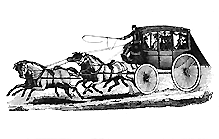
![]()

![]()
![]() John
Litton
John
Litton
![]() LITTON, JOHN (1811-1856). John Litton,
pioneer, was born in North Carolina in 1811 (his grave marker reads 1812) to Lemuel and
Anne (Forrester) Litton. He traveled to Texas on horseback from his family home in Lincoln
County, Missouri, around 1827 to join Stephen F. Austin's "Little
Colony," which settled on the east side of the Colorado River north of the Old San
Antonio Road near the site of present Bastrop several years later. Litton
married Sarah E. Standifer
around 1835 and established a homestead. The couple eventually had eleven children. In
1836 Litton joined Texas revolutionaries forming Capt. Jesse Billingsley's
Mina Volunteers (Company C, First Regiment, under the command of Col. Edward
Burleson)
to defend Texas against Mexican general Antonio López de Santa Anna's
approaching army. Sarah joined other women, children, and elderly settlers ordered to
evacuate the area toward the Sabine River in what became known as the Runaway Scrape.
John and Sarah Litton's first child was born and died during the frantic flight. Litton
later served with 250 soldiers to form a rear guard and protect supplies for Gen. Sam
Houston's Texas forces. He received a section of land in Williamson County,
along with bounty grants in Bell, Lampasas, and Bastrop counties, for his military
service. After the revolution he and his wife settled on the Colorado River near Bastrop.
Four years later he joined a volunteer militia to launch a surprise attack and defeat the
Comanche Indians in the battle of Plum Creek, August 12, 1840.
LITTON, JOHN (1811-1856). John Litton,
pioneer, was born in North Carolina in 1811 (his grave marker reads 1812) to Lemuel and
Anne (Forrester) Litton. He traveled to Texas on horseback from his family home in Lincoln
County, Missouri, around 1827 to join Stephen F. Austin's "Little
Colony," which settled on the east side of the Colorado River north of the Old San
Antonio Road near the site of present Bastrop several years later. Litton
married Sarah E. Standifer
around 1835 and established a homestead. The couple eventually had eleven children. In
1836 Litton joined Texas revolutionaries forming Capt. Jesse Billingsley's
Mina Volunteers (Company C, First Regiment, under the command of Col. Edward
Burleson)
to defend Texas against Mexican general Antonio López de Santa Anna's
approaching army. Sarah joined other women, children, and elderly settlers ordered to
evacuate the area toward the Sabine River in what became known as the Runaway Scrape.
John and Sarah Litton's first child was born and died during the frantic flight. Litton
later served with 250 soldiers to form a rear guard and protect supplies for Gen. Sam
Houston's Texas forces. He received a section of land in Williamson County,
along with bounty grants in Bell, Lampasas, and Bastrop counties, for his military
service. After the revolution he and his wife settled on the Colorado River near Bastrop.
Four years later he joined a volunteer militia to launch a surprise attack and defeat the
Comanche Indians in the battle of Plum Creek, August 12, 1840.

By 1845 John and Sarah Litton had joined Michael Young and Sarah's brothers to establish Young's Settlement, also known as Perryville. The Litton home became the Concord Stage Line station and post office. Litton was appointed the first postmaster of Young's Settlement by President Zachary Taylor in 1849 and was reappointed by President Franklin Pierce in 1853. He served as postmaster until 1855, when he resigned to develop his property. Litton's eldest daughter, Martha Ellen Litton Turner, was postmistress at Young's Settlement during the Civil War. Litton eventually settled his family on a tract of land at the headwaters of Little Sandy Creek northeast of Young's Settlement, in the first house in the area built entirely of sawed lumber. He died of acute appendicitis on July 6, 1856, and was buried in the State Cemetery in Austin.
BIBLIOGRAPHY: Bill Moore, Bastrop County, 1691-1900 (Wichita Falls: Nortex, 1977). Vertical Files, Barker Texas History Center, University of Texas at Austin.
Jan Bullock
"LITTON, JOHN." The Handbook of Texas Online.
Click here for Sarah and John Litton's lineage.
![]() Back to Main Menu
Back to Main Menu Back to Biography Selection
Back to
Sarah's Biography